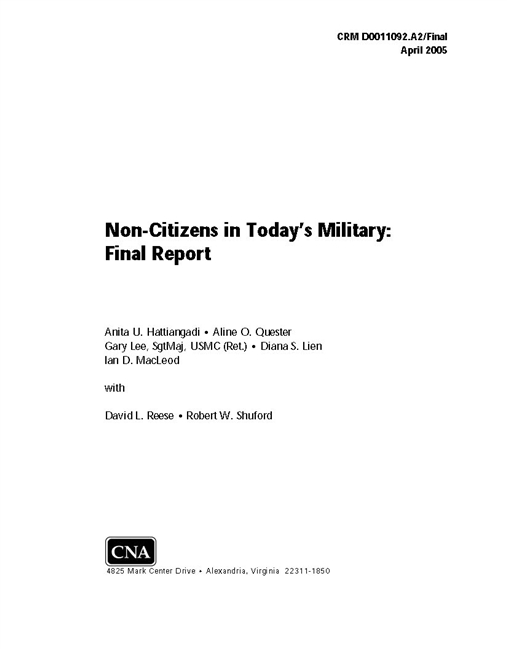Legal Permanent Residents (LPRs) are eligible to enlist in the military and have done so successfully since the Revolutionary War. In fact, roughly 35,000 non-citizens are serving in the active military, and about 8,000 enlist each year. As the military services continue to face a difficult recruiting environment, it is important to recognize the growth in the youth population due to immigration and the potential for success of non-citizen servicemembers.
Non-citizen servicemembers offer several benefits to the military. First, they are more diverse than citizen recruits—not just racially and ethnically, but also linguistically and culturally. This diversity is particularly valuable as the United States faces the challenges of the Global War on Terrorism. Second, we find that non-citizens do extremely well in the military. In fact, black, Asian and Pacific Islander (API), and Hispanic non-citizens have 3-month attrition rates that are 7 to 8 percentage points below those for white citizens. Furthermore, non-citizens have 36-month attrition rates that are 9 to 20 percentage points lower than the attrition rates of white citizens.
Since 9/ 11, several changes in policy and practice have taken place that may encourage more non-citizens to consider military service— for example, the executive order allowing non-citizens serving in the U.S. military to apply for expedited citizenship after only 1 day of active-duty service. The 2004 National Defense Authorization Act accomplished the following:
- Reduced the peacetime waiting period for U.S. citizenship application
- Allowed applicants to be granted emergency leave and priority government transportation to complete citizenship processing
- Eliminated all application fees for non-citizen servicemembers
- Allowed for the finalization of military citizenship applications to take place at U.S. consulates, embassies, and overseas U.S. military installations
- Gave special immigration preference to the immediate family of non-citizens awarded posthumous citizenship.
The military services and the U.S. Citizenship and Immigration Services (USCIS) have worked together to streamline the citizenship application process for servicemembers. Also, the services have initi- ated several programs (such as the Army’s Translator Aide (09L) pilot program) that might be particularly appealing to non-citizens.
Non-citizens who become citizens can reap other benefits from military service, such as the ability to apply for security clearances and to receive substantial bonuses for language skills. Having citizenship opens up a broader array of opportunities, including jobs, to service- members. Finally, naturalized servicemembers get other rights and privileges of U.S. citizenship, such as the right to vote, the automatic granting of citizenship to dependent children, the ability to sponsor family members living overseas, special naturalization or LPR preference for their immediate family, free entry and exit from the United States, and the ability to hold public office.
Many non-citizen servicemembers obtain their citizenship while in the military. In fact, we estimate that non-citizen recruits entering the Air Force, Navy, or Marine Corps from FY95 to FY02 had a 47-, 16-, or 33-percent chance, respectively, of having U.S. citizenship recorded in their personnel files by September 2003.
Although there have been great strides in making it simpler and more convenient to apply for citizenship while serving in the military, even more could be done to facilitate the process. Our recommendations include (a) providing military recruiters with information on what documents and information non-citizen recruits will need if they want to apply for citizenship while serving in the military and (b) developing materials for applicants or new recruits that explain eligibility for expedited citizenship, the benefits of filing for citizenship while in the military, and the benefits of attaining citizenship.
Download reportApproved for Public Release; Distribution Unlimited. Specific authority: N00014-00-D-0700.
Details
- Pages: 138
- Document Number: CRM D0011092.A2/Final
- Publication Date: 4/1/2005
